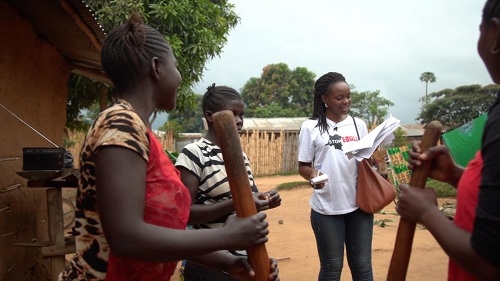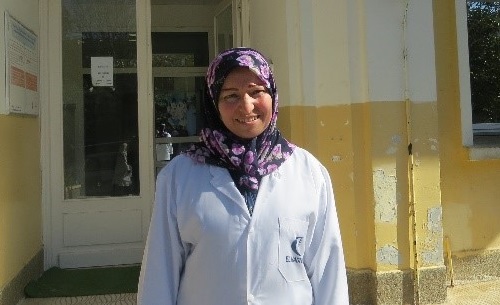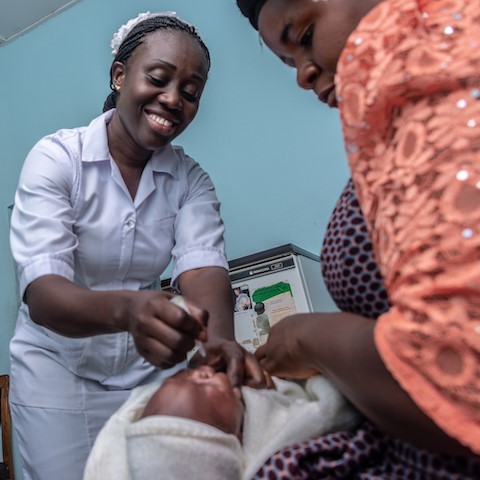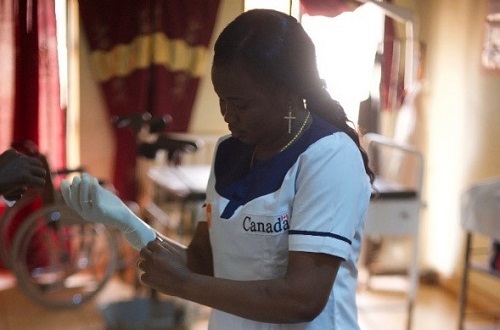Nurses and midwives are crucial frontline health workers. They toil through some of the most challenging conditions: low salaries in some contexts, long working hours in sometimes wanting hygiene environments, the threat of deadly diseases among other challenges. They are committed to making and keeping the world a healthier place even if it may put their life in jeopardy. They are there to prevent us from becoming ill through vaccinations and vital health education. They are there to carry new life into this world. And if we become ill, they are there when we are under their care and remain by our side.
The World Health Organization estimates that the world needs 9 million more nurses and midwives to achieve universal health coverage by 2030. This goal is reachable. But for all they do for us, nurses and midwives around the globe deserve more support to make their work as safe and their sacrifices as rewarding as possible.

Rose Amboko, DRC
One of the ways that was used to overcome community reluctance towards Ebola response in the Democratic Republic of the Congo was to recruit members of the community to be part of the frontline teams working to halt the spread of the virus. Rose Amboko, from the north-eastern Beni town, was trained as a community health worker, easing the reach to communities and monitoring people who came in contact with Ebola patients. Training community members is part of a long-term investment in local health services after the Ebola response eventually winds down.

Karima Azzoug, Algeria
Karima Azzoug has been a nurse for 25 years at the Etablissement Hospitalier Spécialisé in El-Kettar, Algiers. "When the time came to choose my path, I went into health because I wanted to take care of others and, for me, being a nurse allowed me to do that. Being a nurse is a very noble profession because people's lives are at stake. I wouldn't change it for anything in the world.” For nurse Azzoug, good collaboration and teamwork are equally important for effective patient care. "The core of our work is the patient. By working together, we ensure that our actions are coordinated so that everyone plays their part to the best of their ability. Caring for a patient does not mean only giving them medication. Above all, you must monitor them closely, from A to Z: Are they eating properly? Are they clean? Is the bed clean? Is he or she emotionally well?” Nurse Azzoug is also dean of the nurses teaching in her hospital. "I supervise the students assigned to our department,” she said. “I show them through my example that a good nurse must be meticulous in her work, be a good listener, be attentive and have concern for others.” She is proud of her commitment to the profession: "I feel a real love for my patients. They come to us in a situation of extreme vulnerability and I am happy to provide them with care and comfort. But for me, complete happiness is when I see the person leaving the hospital in good health. To see a person recover from an illness and to know that you have contributed to that – I think it's the best thing in the world.”

Naomi Kahansim, Nigeria
I love to put smiles on people’s faces. When people come with their problems and I’m able to take care of them and they leave smiling – with that kind of smile I get great satisfaction,” said Naomi Kahansim, a registered nurse and midwife in the Plateau State Specialist Hospital in Jos, Nigeria, where she tends to pregnant women and immunizing babies up to a year old. Her commitment to nursing and midwifery was featured in a celebratory tribute to African Vaccination Week 2019. Nurse Kahansim specialized in midwifery because she wanted “to give my best to one area”, but ultimately as a midwife “you’re helping to bring people into the world.” And that is the greatest joy, she said. Kahansim and her colleagues immunize 20–30 babies a day typically, but, unfortunately, 99% of her patients only cry when they see her. Thinking of how she makes all those babies cry made her laugh out loud. Because it, too, is a delight. “It’s a thing of joy to prevent them from coming into contact with diseases that are preventable,” she explained.

Viola James, South Sudan
South Sudan has one of the highest rates of maternal mortality globally, at a 2019 estimate of 789 maternal deaths per 100 000 live births. One reason is the low rate – about 12% – of hospital births. With the concerted efforts of the Ministry of Health in South Sudan, supported by the World Health Organization, the Government of Canada and other partners, the Wau Teaching Hospital launched a programme to train midwives in 2011, in the post-independence period, when there were only six qualified professional midwives in all of South Sudan. Now their ranks have swelled to more than 700. The donors also funded the building of a dedicated maternity operating theatre within an expanded maternity complex at the Wau Teaching Hospital and five others across the country. “Sometimes we work double shifts without stopping for lunch,” said Viola James when featured in a 2019 photo essay on how the midwife programme was helping to reduce the maternal mortality rate. “I know how to prevent an HIV-positive mother transmitting the virus to her baby during birth,” she explained. “I know how to manage eclampsia and post-partum haemorrhage and how to identify obstructed labour.”
Message from the WHO Regional Director for Africa
This year, on World Health Day, as front-line health workers lead the charge against the COVID-19 pandemic, at WHO we want to appreciate the life-saving roles of nurses and midwives. This is a year-long celebration, as part of the International Year of the Nurse and the Midwife.
Nurses are at the core of the primary health care approach, which is a cornerstone for attaining universal health coverage. They make up at least half of the global health workforce. Midwives and nurses are critical links between individuals, families, communities and the health system. They provide support along the continuum of care, from promotion, to prevention, treatment, and rehabilitation to end-of-life care.
In the COVID-19 response, nurses are working non-stop to provide quality care, share health information, implement infection prevention and control, serve in intensive care units, and ensure routine services continue to be delivered. Midwives are continuing to support mothers to safely deliver their babies.
Social media cards

Sanito Deng Awer,
South Sudan

Viola James,
South Sudan

Naomi Kahansim,
Nigeria

Enias Mashaba,
Zimbabwe

Karima Azzoug,
Algeria

Helen Masika,
DRC

Paluku Ngolosamy,
DRC


